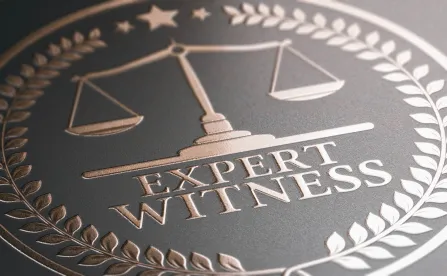Over the past several years, we’ve been tracking discussions and proposed amendments to Federal Rule of Evidence 702. On June 7, 2022, the Judicial Conference Committee on Rules of Practice and Procedure unanimously approved amendments to Rule 702. The amendments reiterate the judge’s role as gatekeeper and emphasize that expert testimony should not be presumed admissible. The Committee explained that the amendments do not impose any new requirements, but, instead, clarify the requirements for the admissibility of expert witness testimony. Rule 702 with the Committee’s red-line changes are shown below:
Rule 702. Testimony by Expert Witnesses:
A witness who is qualified as an expert by knowledge, skill, experience, training, or education may testify in the form of an opinion or otherwise if the proponent demonstrates to the court that it is more likely than not that:(a) the expert’s scientific, technical, or other specialized knowledge will help the trier of fact to understand the evidence or to determine a fact in issue;
(b) the testimony is based on sufficient facts or data;
(c) the testimony is the product of reliable principles and methods; and
(d)the expert has reliably appliedexpert’s opinion reflects a reliable application of the principles and methods to the facts of the case.
The amendments will take effect on December 1, 2023, if the U.S. Supreme Court approves the revisions and if Congress does not enact legislation that modifies or rejects the changes. In its Note, the Committee explained its dual rationale for the amendments:
First, “to clarify and emphasize that expert testimony may not be admitted unless the proponent demonstrates to the court that it is more likely than not that the proffered testimony meets the admissibility requirements set forth in the rule. See Rule 104(a). This is the preponderance of the evidence standard that applies to most of the admissibility requirements set forth in the evidence rules…[M]any courts have held that the critical questions of the sufficiency of an expert’s basis, and the application of the expert’s methodology, are questions of weight and not admissibility. These rulings are an incorrect application of Rules 702 and 104(a).”
Second, “to emphasize that each expert opinion must stay within the bounds of what can be concluded from a reliable application of the expert’s basis and methodology. Judicial gatekeeping is essential because just as jurors may be unable, due to lack of specialized knowledge, to evaluate meaningfully the reliability of scientific and other methods underlying expert opinion, jurors may also lack the specialized knowledge to determine whether the conclusions of an expert go beyond what the expert’s basis and methodology may reliably support.”
As these amendments simply clarify the Rule and attempt to remedy prior misapplications of the current Rule, counsel and judges should not wait until December to follow the Committee’s guidance. In fact, courts are already referring to the amendments in their opinions. See White v. City of Greensboro, 586 F.Supp. 3d 466, 477 (M.D.N.C. 2022) (citing Sardis v. Overhead Door Corp., 10 F.4th 268, 283 (4th Cir. 2021) (noting that the Federal Rule of Evidence Advisory Committee has recently stated that judges must "apply the preponderance standard of admissibility to Rule 702’s requirements".) (quoting Advisory Comm. on Evidence Rules, Agenda for Committee Meeting (April 2021)). Also see Donalds v. Ethicon, Inc., No. 22-1737 (4th Cir. 2023) (noting that it is the district court’s responsibility to “ensure that an expert’s opinion is based on scientific, technical, or other specialized knowledge and not on belief or speculation”.) (quoting Sardis 2021 at 281).
While expert testimony can assist jurors evaluate complex medical and scientific issues, it can also be misleading if not properly scrutinized by the court. The amendments to Rule 702 are a welcome reminder of the court’s gatekeeping function. We will continue to monitor the Rule’s approval process and update this post with any developments.




 />i
/>i
